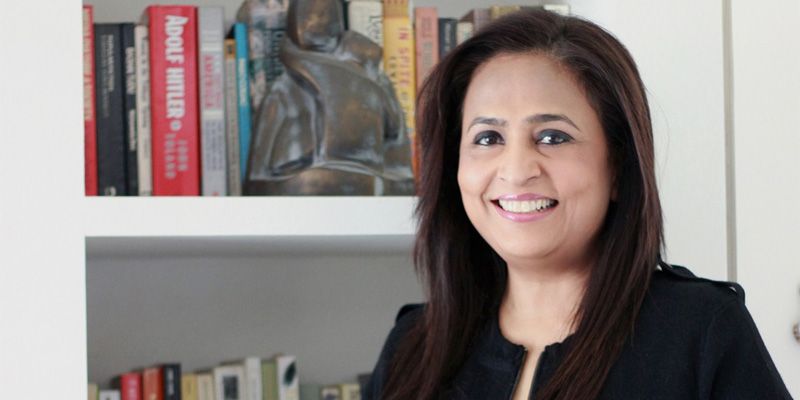Pakistani Serials on Indian Telly for the First Time: Zee's Zindagi Promises Entertainment That Will Make History
Shaijla Kejriwal is a woman on a mission. Come June 23rd, the Chief Creative Head of Special Projects at Zeel for Zindagi is determined to invade your bedroom (or your drawing room, wherever your television set is kept) and introduce to the nation the magnificent spectacle that is Pakistani television. This venture is an absolute first for Indian TV, a daring one at that. Kejriwal is quick to acknowledge that when it comes to India Pakistan, the legacy of conflict that the two countries share does complicate matters. But it is this mind-set that she is out to change. It is her earnest hope that by exposing Indians to general Pakistani entertainment, we will get a taste of the country’s actual culture- a culture that is far removed from what propaganda press would have you believe. This is not just entertainment. This is history in the making. In conversation with the lady making that history happen.

What cultural indicators sparked the idea for launching a venture like this?
There were many reasons, but the chief one was very personal. This has nothing to do with the business aspect of a channel. I felt we were becoming more and more polarised and intolerant society as a whole. The other reason was that we are each made to hear propaganda driven news about the other country, news which the powers want us to hear about each other. It is so strange that countries which were one up to a few decades ago are so driven apart now. Indians have no idea at all about what is going on in Karachi or Lahore apart from what is considered conventionally newsworthy. And all “newsworthy” stuff is basically negative, like terrorist attacks and so on and so forth.
I studied comparative literature at Jadavpur University and read a lot of Urdu literature, alongside Hindi and Bangla. And whatever I was reading of Pakistani culture was a culture I was falling in love with. After reading the beautiful words of Pakistani masters, one has to wonder why there is so much fear!
I remember the first time I went to Karachi I was so afraid. This fear has been drilled into our collective psyche. We have been brainwashed into thinking that it is an enemy state in perpetual terror. And that is not the truth at all.
We talk about how we love their music and their singers- Rahat, Nusrat, the works. We talk about how we love their clothes. But that happens at a slightly more elite level. I thought that why don’t we start something that is mass based. When Aman Ki Asha started, I remember feeling very jealous. That I something that I had wanted to do for a long time, but was glad that it had been launched. Since it was not a mass medium platform, it could not sustain its initial vigour. All initiatives like this have momentum for a couple of years and then they fizzle out. One Sadbhavna bus will go, then something will happen, and then we’re back to square one.
These are not happening on a one billion to sixty million home contact. You have to change mind sets of people, you have to change mind sets regarding a certain religion. Why is, for example, terrorism and Muslim or terrorism and Pakistani becoming interchangeable words? This is a frightening circumstance and not the way forward. I feel that this is venture is something that is very important for this country. And I truly believe that this would be a historic step in fostering people to people contact between the two countries. It will foster the much needed empathy.
For example, the first scene of this serial we are launching opens with a scene so relatable to Indian audiences. There is this girl sitting on the bed. Her sister comes in and they launch into a very regular good hearted bickering. This conversation could be happening anywhere in India. When audiences will realize how similar we all are, we will become more tolerant.
Almost all mainstream national Hindi soaps are filmed around a very specific religion, caste and even region. Mythological depictions, too, are overwhelmingly of one religion. Do you think powers of storytelling will be able to conquer the biases that will inevitably arise when watching a Pakistani soap?
Let me tell you what I think is the power of storytelling. Storytelling can make a human being into God. Ram becomes God, Krishna becomes God by virtue of what? Storytelling. We come to believe in the truth of their divinity through the stories we hear. This fact makes me hopeful. If you have good stories to tell, stories that can connect with the people, then this layer of intolerance will melt away. This hatred that exists in certain people is only a few years old. I also feel that, in India, there is innate curiosity about Pakistan. There is such chemistry between the two nations. You can love each other, you can hate each other but you cannot ignore each other. And that is the most beautiful relationship you can have. We love their cricketers, whether you are talking about Wasim Akram or Imran Khan. Today when Shafqat Amanat Ali’s songs play in every city and town in India, people don’t pause and say that he is a Pakistani. People are more tolerant than the media would have you believe. It is time to tap into that goodness.
India prides itself on being a secular country. But when it comes to national television and cinema, there is such little representation of Muslims even though they comprise such a huge chunk of the population.
Absolutely. And not only is there little representation, there is so much misrepresentation of this particular religion in the mass media. My belief is that because Zee Zindagi will be in your home 24/7, your mind set is bound to change. Just like how Bollywood films are so popular in Pakistan you know, they love our movies and they love out stars; likewise I am confident that once India witnesses the sheer genius of Pakistani television, we too will come to embrace it as our own. See this movie now that has released, Filmistan. Brilliant yaar! Na Hindustan na Pakistan, what unites us is Filmistan.
What happens in that a movie like this will release once in a while, bringing with it a spurt of positivity. Then once it has done the rounds of film festivals and theatres, and then go. Out of sight, out of mind. Because I am bringing this to your television in your home, in your drawing room 24/7, without such misrepresentations it is bound to change mind sets and herald in a new era.
My colleague’s wife declared, “Main toh Pakistani serial dekhungi hi nahi” (I will never watch Pakistani serials). My colleague told her that I can bet on it. Once you start watching, you won’t be able to stop because the stories themselves are so amazing.
I am not saying because they are such brilliant stories of such brilliant people. They are regular stories about ordinary people. There is such honesty in that storytelling that it is endearing.
Especially given the current standard of television in India
I am a part of this industry and I am telling you this. Because of commercialisation, we have become creatively corrupt. Therefore when this channel launches, it is going to make a lot of people think. The social and religious tolerance is just one way of looking at it. But the fact that the quality of storytelling on mainstream television can be so good and of such stellar quality that it will force our own television’s creative professionals to re-examine themselves. Everything is not about Paisa pheko tamasha dekho (throw the money, watch the show). There has to be a soul in the story that you are selling. Indian television is currently devoid of that soul. It’s all about loud random and crass nonsense. Loud trash like this numbs the mind, makes us close our thoughts, makes us vulnerable to all kinds of cheap propaganda and ultimately creates a less tolerant society.
What are the general trends in Pakistani television? How different is it from Indian television?
Since they are shorter series with a limited number of episodes, they are focused on telling a story. We don’t tell stories anymore, just narrate random incidents one after the other. While in a Pakistani show the premise may be very small, but it still has a tangible beginning, middle and an end.
I was a part of making Kyonki Saas Bhi Kabhi Bahu Thi for nine years. But if you ask me the story, I won’t remember it. There are villains and heroes and what character did each day. But there is no story.
Perhaps since Pakistan does not have much of a movie industry, their television space is rife with so much beauty and creativity. Whereas India has a thriving film scene, but when it comes to television we are barren.
Exactly. They put all their thought and creativity into making beautiful television. Moreover, the kind of stories that you see on Pakistani TV won’t translate well into movies. They need time and duration for them stories develop and the emotions to pan out (Shailja narrates quite a few stunning synopses of different serials, but brevity of space dictates their exclusion from this interview). Then it culminates in a grand climax a few weeks later. A movie will not be able to do it justice.
Did you face any kind of governmental or bureaucratic opposition while putting this plan into action?
Not at all (emphatically).
Are you expecting any kind of controversy once the channel goes live? What kind of eventuality are you planning for in case such protests?
I am hopeful that we will not be childish enough to make this into any issue. I am really hoping for the sake of my nation that we will not be silly enough to do something like this. We have tried to stay away from anything controversial. We have stayed away from any kind of India bashing or ban-worthy elements. But in general Pakistani content has little to do with such political statements and more focused on the daily life, struggles and philosophies and at any rate it is that which we want to showcase.
I believe as a nation we have matured enough to be gracious about the whole issue. When we say ‘Acche din aaney wale hai’, I really hope that it is so and that we have good things to look forward to.
Indian television is a mercenary playground for corporates. This concept is so contrarian to any venture undertaken on TV, not least because it will take some time to yield positive results. How did you get Zee to back a vision like this?
My experience is this. If you genuinely and passionately believe in something, then you will be able to make it happen. I believe everybody- be it a corporate giant or an individual- everybody has their good moments and bad. That’s life. No one can be commercial all the time and no one can be altruistic all the time. There has to be a balance. All of us, deep within our hearts, want to do something good and want to be remembered for doing something good. When you want to achieve something worthy, you have to invoke this inherent goodness in others.
Where Zee was concerned, I had a gut feeling. I saw their tagline, “Vasudhaiva Kutumbakam”, which means that the world is your family. And this had been created quite recently, sometime in 2012. The tagline could have been anything. It could have been Entertainment Ka Badshah or Zee: The No 1 Entertainment channel of India. I felt that if someone has created this tagline, it had to have come from a special place. That thought is what I needed to build upon. If your tagline is that the world is my family, then let’s start with our neighbours.
'Vasudhaiva Kutumbakam' or 'Good fences make good neighbours,' what is your opinion? Sound off in the comments below.









![[Funding alert] IIT Kanpur-backed startup Phool.co raises $1.4M in a pre-Series A round](https://images.yourstory.com/cs/2/e641e900925711e9926177f451727da9/Image64ln-1598521641321.jpg)

